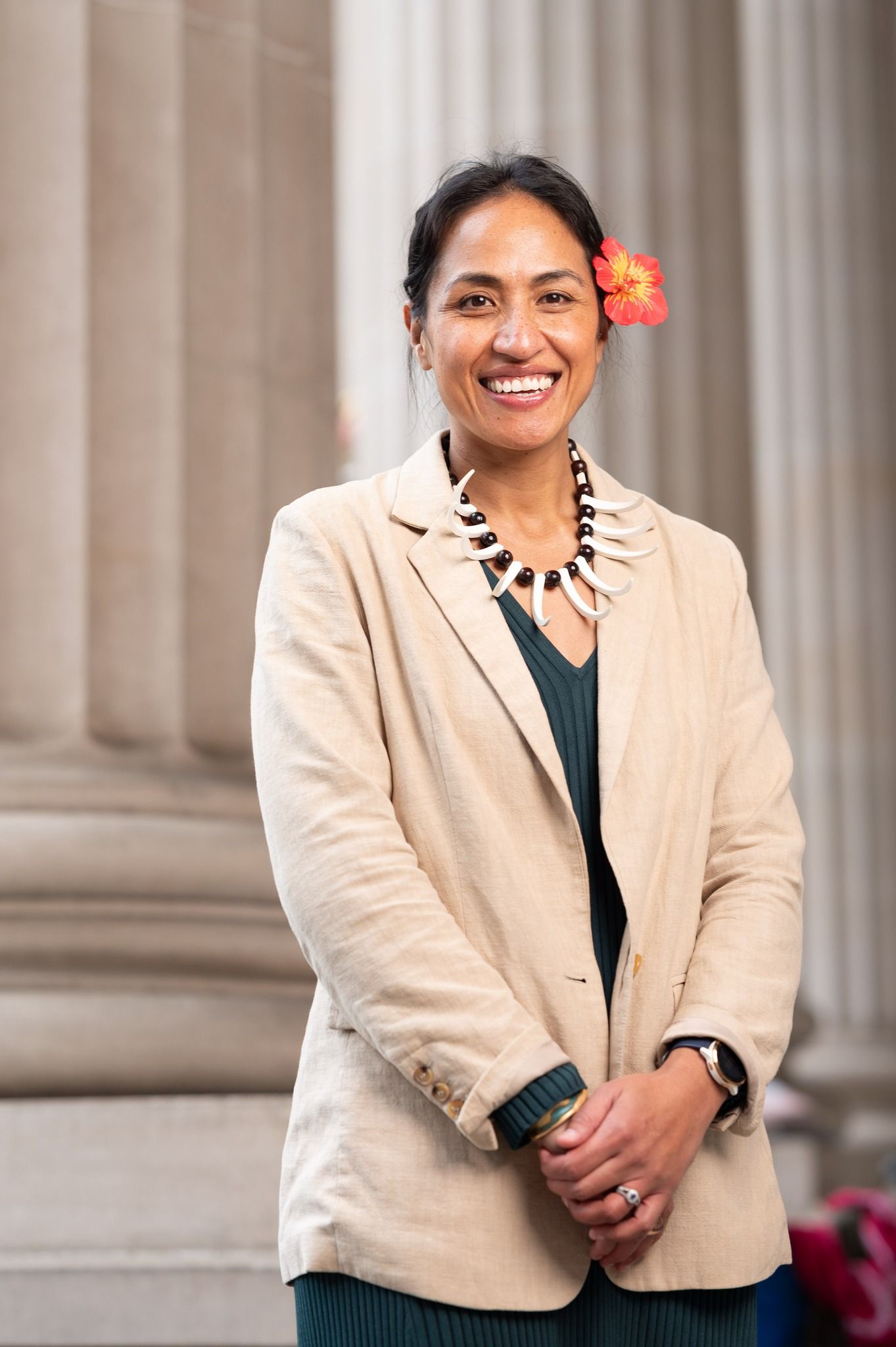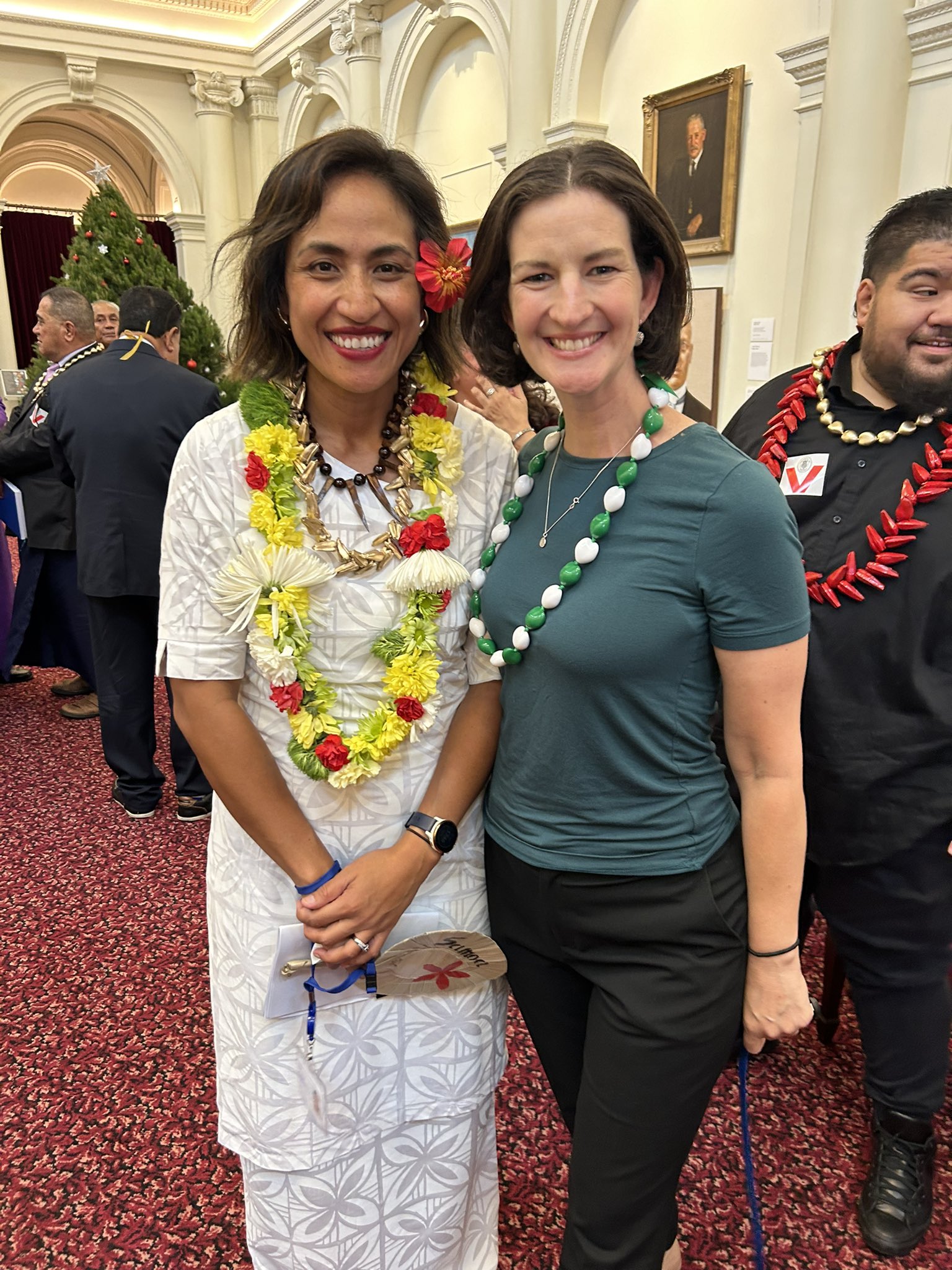

Anasina Gray-Barberio (centre) is the first Sāmoan MP in Australia's state parliament.
Photo/Facebook
Cultural practice denied as first Sāmoan MP sworn into Victoria’s parliament
The Green Party's Anasina Grey-Barberio has become the newest member of the legislative council in Melbourne, but the historic moment was overshadowed by political protocol.


South Auckland artist donates song proceeds to local charity



How Trump’s 'America first' policies could impact NZ and Pacific

South Auckland artist donates song proceeds to local charity


History was made this week as the first Pacific MP was sworn into Victoria's parliament in Australia.
However, the moment was marred by a decision not to allow a Sāmoan hymn to be sung from inside the chamber.
Anasina Gray-Barberio (Falealupo, Fasito’o) is the new Greens legislative council member for Victoria’s Northern Metropolitan region and was sworn in on Wednesday evening.
Family and friends were not allowed to sing pese lotu inside the chamber; instead, they were allowedVictoria ono sing from the corridor and gallery.
Gray-Barberio told the National Indigenous Times it was “incredibly disappointing” that a request to suspend standing orders by leave for a short period was denied.
"As the first Pasifika-Sāmoan person to be entering this Parliament, this is an incredibly significant moment, and it's important for me to be able to practice my culture and have my community here for this moment.”
Grey-Barberio criticised the Victorian parliament in her inaugural speech.
“We were banned from sharing a small part of our culture with you this evening, a part of our culture that comes into this place with peace and goodwill.
“I urge you, it is not my community you need to be scared of. What you should be scared of is the fear you hold in your heart for communities that are not representative in this political institution.”
Culture vs politics
This comes after a haka was performed in New Zealand’s Parliament earlier this month, sparking questions over whether cultural practices can mix with a Westminster parliamentary system.
Te Pāti Māori co-leader Debbie Ngarewa Packer accused the New Zealand Government of picking and choosing when cultural practices were used.
“They're happy to have our karakia, karanga, and waiata when it suits.”

Anasina Gray-Barberio. Photo/Supplied
Under Victorian legislative standing orders, only the Speaker may admit a stranger onto the floor of the chamber, and a member must not bring a stranger into any part of the House that is set aside for members.
In 2016, former Minister for Indigenous Australians Linda Burney was sung into Parliament by Wiradjuri woman Professor Lynette Riley after delivering her inaugural speech.
Grey-Barberio said it was a missed opportunity for the House to embrace diversity.
“I will not be the last to request for cultural rituals to be shared, but I do hope that for the next person representing a different part of our society, this institution makes space for them and who they are.”
Fellow Melbourne Green MP Ellen Sandell agreed.
"Surely, in 2024, parliament should be able to accommodate cultural traditions such as this."

Green MPs Anasina Gray-Barberio and Ellen Sandell. Photo/X
The Australian state of Victoria, with a population of seven million, has 79,000 Pacific people.
In her maiden speech, Gray-Barberio said people need to see themselves reflected in politics.
“Representation matters, not just for our community, but for all marginalised communities being met with one obstacle after another.
"They say you can't be what you don't see. I say, don't be afraid to be the first.”
Staying true to her roots
Gray-Barberio was born in Sāmoa before moving with her family to the diverse suburb of Broadmeadows as a teenager.
“We grew up with families of different cultures, sharing stories of resilience and collective experiences, but on the other side of this was hardship.
“Anytime you said you were from the 3047 postcode, immediately expectations were lowered and stigmatising actions were instant.”
She founded Engage Pasifika, an organisation addressing health inequities in the local Pacific community. She wanted to continue her advocacy for homeless communities, family violence victims, foster care and refugee families in her political role.
“I have met many in the community who, despite living in a wealthy first-world country, struggle to make ends meet. I've met people who drive 40 minutes to the cheapest market every week just so they can save about 30 bucks on groceries, even though the two major supermarkets are just up the road.”
Climate change was also a major focus of Gray-Barberio’s speech, as she highlighted the growing environmental challenges locally and in the region.
“Our Pacific neighbours, from Kiribati, Tuvalu and the Marshall Islands, will be among the first climate refugees.
“Rising tides and environmental degradation are forcing them to migrate to countries that do not share their cultural history, endangering their cultural rights and potentially giving up their sovereignty”, she said.
“This displacement is not just a matter of survival for our people. It is a profound loss of identity and self-determination, as entire nations are pushed to the brink by the climate crisis.”
The Victorian legislative Council has 40 seats, divided into eight regions with five seats each. Gray-Barberio won the ballot to replace Green MP Samantha Ratnam, who is moving into national politics.
The Green Party seat has been held since 2006, when the Northern Metro region was established.

